How Devolver Digital is redefining videogame publishing
A behind-the-scenes look at the industry’s most eclectic studio.
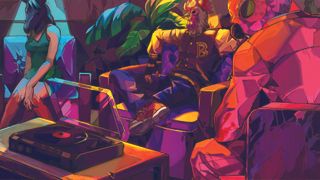
This article was originally published in PC Gamer issue 296. For more quality articles about all things PC gaming, you can subscribe now in the UK and the US.
Devolver digital isn’t your average videogame publisher. I realise this in a basement, fifteen minutes away from San Francisco’s Game Developers Conference, watching colourful penises slither across the screen. Next to me is Mike Wilson, one of Devolver Digital’s five founders. We both watch as two dicks circle one another like professional wrestlers, each trying to penetrate the other’s asshole. Cheers erupt from those around us as one succeeds, then rise even higher when the other also penetrates, forming a swirling genital ouroboros. Mike turns to me and smiles. “Welcome to the Devolver Bunker.”
Calling it a bunker might be too dramatic—unless you think several dozen game developers, a keg, and a karaoke machine are what’s worth saving in the apocalypse. But this bunker, now a time-honoured tradition during the Game Developers Conference, perfectly represents everything Mike wants Devolver Digital to be: a place on the outer fringe where creators are free to create. In here it’s just you, a selection of likeminded individuals, and the mutual desire to make something interesting.
For Evan Greenwood, one of the people behind the explosive shoot-’em-up Broforce, interesting meant Genital Jousting. It’s a game where anywhere from two to eight penises can face off in an effort to engage in mutually beneficial—and consensual—coitus. The way these flopping, flaccid penises are animated is both slightly disturbing and hilarious, the Mount Your Friends sweet spot of party games. From the sounds of it, it’s going to be one of Devolver Digital’s next games.
Power games
Devolver Digital is more than just a publishing company for weird indie games about cocks, however. It’s pioneering a new way of thinking about the relationship between developer and publisher. “It’s been a very weird fucking journey,” Mike says when I ask him about his past. It’s hard not to see him as a kind of father with a dozen bastard children. Across two decades working in the industry, there’s no denying how central his marketing and business development has been to the growth of PC gaming. Quake, Doom, Deus Ex, Mafia, Max Payne, Tropico—over the years, Mike’s had his fingers in a lot of videogame pies.
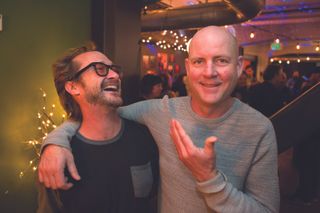
Being at ground zero of the PC gaming explosion wasn’t quite the incredible experience you might imagine. Sure, he was once allowed to commission a giant vagina archway for a Microsoft Windows 95 launch event, but that doesn’t seem to be much of what he remembers from that time. Instead, much of Mike’s past is marked by battles against the corporate need to control game developers in every way possible—that ever-present tension between business and art. He’s watched as many naive developers, often barely more than teenagers, fell victim to exploitative contracts, empty promises, and delusions of grandeur. He’s seen egos ballooned to unmanageable sizes, friendships torn apart by avarice, and careers ended to preserve corporate secrets.
He’s also seen what happens when developers wise up and start making a fuss. “The traditional method of dealing with difficult talent is to buy them,” Mike explains. “The publishers then own their intellectual property and can continue to crank out sequels with less uppity game developers. That’s the point of owning the developer, you never have to listen to them.”
PC Gamer Newsletter
Sign up to get the best content of the week, and great gaming deals, as picked by the editors.
Distaste for that kind of business practice is what led Mike to found Devolver Digital, along with business partners Harry Miller, Rick Stults, Nigel Lowrie, and Graeme Struthers. They wanted to create a videogame publisher that would cultivate a different kind of relationship with developers. Devolver Digital’s contracts grant the developer of the game the lion’s share of the royalties, and it’s the developer who has the final say on every major decision, too. In the end, Devolver Digital is merely an enabler, giving scrappy indie studios the resources they need to build great games.
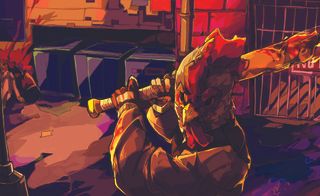
“He who has the gold makes the rules, that’s just the way that business goes,” Mike says, “but we saw that this industry hadn’t really realised that the developers are the talent, and eventually they’re going to be recognised as who’s important in these relationships. It’s one of the things at the heart of Devolver.”
When I ask what else makes up Devolver’s heart, Mike laughs. “Have you met Nigel yet?”
Cock and bull
Nigel Lowrie is, at first glance, a wonderful kind of contrast to Mike Wilson. He’s tall, well-dressed, and looks like he’s never been to Burning Man. He’s also the most important voice an indie developer might ever hear. “I’m a people person,” he says. “Most of the things that I do involve looking for games we might want to publish, talking to developers, and then, once a game has come into our warm, loving embrace, working on the marketing aspect with them.”
Nigel’s involvement with Devolver goes back further than the company itself. In 2008, Mike and other Devolver founders, Harry and Rick, were trying to bring their publishing vision to life under the name Gamecock Media Group. “I was working in advertising in Dallas at the time,” Nigel recalls, “for companies like Seven-Eleven and Hot Pockets. We got to do cool things now and again, but after a while I wanted to put my head in a microwave oven. I wanted to do marketing for something I liked, so I sent Mike a blind email telling him I loved videogames with my whole body including my ‘pee pee.’ That got his attention.”
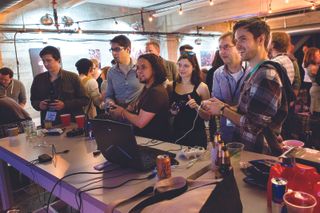
The year 2008 had other plans. Gamecock, like many of Mike’s previous companies, had only been possible with investment from a third party, but getting help from the outside was beginning to feel like it caused more problems than it solved. When Gamecock’s sole investor pulled out during the height of the 2008 financial crisis, Gamecock crumbled to dust, and Mike, Harry, Rick and Nigel weren’t about to make the same mistake again. “We decided to start our own thing under our own control and not beholden to someone else,” Nigel says, “and that’s how Devolver Digital was born.”
Sam but different
Devolver didn’t immediately become the recognised name it is now. Its first four years of life were spent working as the publisher for Croteam and its famous shooter, Serious Sam. Devolver was bringing Sam back from the grave thanks to a series of popular HD remakes, but they also wanted to experiment with publishing their own small-scale, high-concept games, and Serious Sam was the perfect test subject.
In late 2011, Devolver contracted developers Mommy’s Best Games, Be-Rad Entertainment and Vlambeer—the studio that would go on to make hits such as Nuclear Throne—to create small indie game spin-offs set in the Serious Sam universe. While none of these contracted games set the world on fire, this did inspire a close relationship between Devolver and Vlambeer, who had just come across a group of Swedish developers whose game would.
In a rundown apartment in Gothenburg, Sweden, Jonatan “Cactus” Söderström and Dennis Wedin had a common problem for indie developers: no money. The two had been designing games together since meeting through Dennis’s band, but if they were going to keep the lights on, they needed to create something more substantial than the bizarre freeware creations Jonatan had been pumping out since he was a teenager. Digging through the refuse of half-finished and abandoned projects, the two happened upon the remains of Super Carnage, the soul of which would go on to create one of the most successful indie games ever.
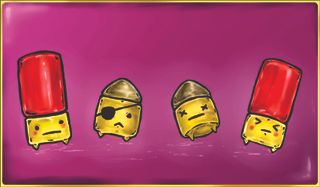
“I’d always been a fan of Jonatan’s games,” Nigel explains. “They were very peculiar and weird. One day Rami Ismail from Vlambeer emailed me and said, hey, Jonatan is working on a game he wants to turn into something bigger. He introduced me to Jonatan and then he sent me a build to play. It was one of those things where it was rough, but you instantly understood why it’s going to be special.”
Nigel believed that this game could be something different. At that time, indie videogames were just growing into the massive phenomenon they are today, and this project between Jonatan and Dennis was going to be a huge help. Trusting his gut, Nigel showed the game to the rest of the founders at Devolver. “We had no track record, we’d only worked with Croteam and Vlambeer,” Nigel explains. “I took it to the team and everyone dug it, but, at the time, we really didn’t have a lot of money, we had all been working for free to this point—we didn’t pay ourselves. We all had back pay, so a few of us went in and said, hey, to make this game I will forfeit some of my back pay because this is how much we believe this could work. We really put our money where our mouths were.”
The prototype transformed into Hotline Miami, an eye-catching and idiosyncratic top-down shooter that demanded attention with its bloody, neon punk aesthetic. It became one of the biggest indie success stories ever, taking the world by storm with its violence and pumping electronic beats. Between the first game and the sequel, Hotline Miami 2: Wrong Number, the series would sell over five million copies.
The success of Hotline Miami changed Jonatan Söderström and Dennis Wedin’s lives as much as it changed everyone’s at Devolver Digital. The company found its groove and began seeking more indie titles that it could help bring to life—going on to publish hits such as Luftrausers, OlliOlli and The Talos Principle. As indie games exploded across PC and consoles, Devolver Digital was there, fanning the flames. “To me, it boils down to one thing,” Mike says. “People are remembering that games are supposed to be fun rather than impressive.”
Success story
Hotline Miami brought Devolver to a place where it wasn’t just capitalising on a trend in videogames, but a cultural one too. Mike explains to me that indie developers aren’t the same breed he worked with all those years ago when he first got into the industry. They’re leaner, more collaborative, and less interested in rolling in piles of money. “I love that people aren’t trying to use their game as a stepping stone to make a bigger one,” he says. “And you really see that when someone makes it, they cannot wait to help others succeed too.”
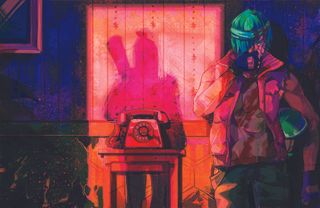
That lack of ambition for the hollow trappings of success couldn’t be a better fit for Devolver. Despite their success, the founders are adamant on not turning their company into anything more than it is. They don’t need an extravagant office or a pushy marketing team, Mike says, and they certainly don’t need to sell out to a bigger company. In fact, the founders of Devolver Digital are so opposed to becoming the stereotypical publisher, they even invented their own fictional persona to be the face of the company.
His name is Fork Parker, and his bizarre wit allows the members of Devolver to do their work without the sweating from the heat of the spotlight. As Mike and I sit outside, taking a breather from the bunker below, he tells me something I want to always remember: “There’s freedom in being small.”
That freedom is the foundation of a new kind of relationship between publisher and developer, one built on trust and respect rather than profit margins and value propositions. When we return to the Devolver bunker, we find it packed with people. Developers chat excitedly, people flail around wearing VR headsets, and Genital Jousting has been replaced by a new game where you play a grizzly bear trying to buck off what looks like a naked Danny DeVito. There’s an undeniable sense of community here—and at the centre of it stand just five people.
I don’t have too much time to think about it because as soon as we step back inside Mike turns to me and smiles. “I hope you like tequila.”
With over 7 years of experience with in-depth feature reporting, Steven's mission is to chronicle the fascinating ways that games intersect our lives. Whether it's colossal in-game wars in an MMO, or long-haul truckers who turn to games to protect them from the loneliness of the open road, Steven tries to unearth PC gaming's greatest untold stories. His love of PC gaming started extremely early. Without money to spend, he spent an entire day watching the progress bar on a 25mb download of the Heroes of Might and Magic 2 demo that he then played for at least a hundred hours. It was a good demo.
Most Popular



